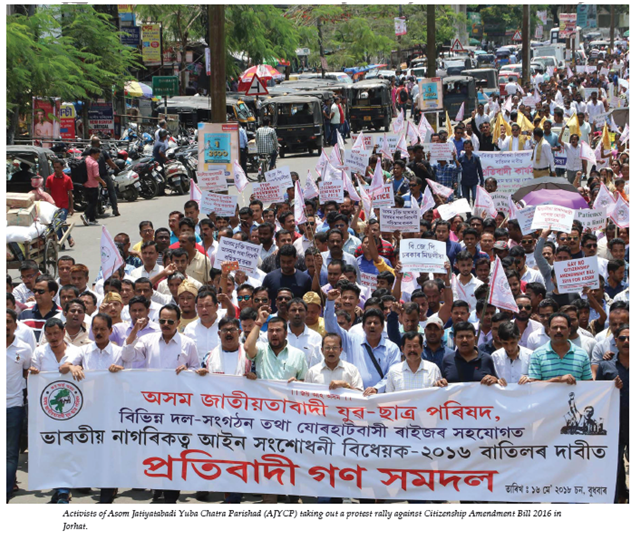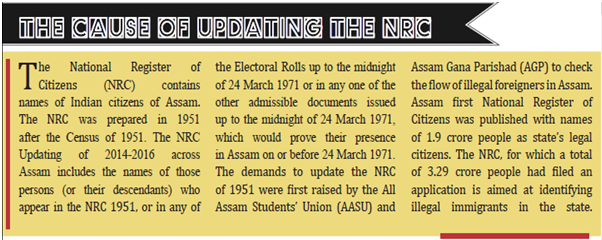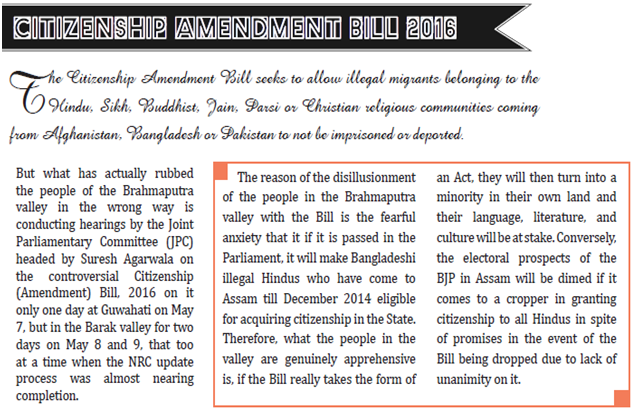
Assam, if not the Barak valley, is definitely burning. At least, if someone follows the media reporting and related contents, it’s convincing that the Brahmaputra valley of the Northeastern State has been witnessing an uproarious situation for a few weeks now. Few observers may compare the situation to the days of Assam agitation, which culminated in 1985 with an accord signed by the agitators and the Union government in New Delhi. Millions of participants in six years long agitation wanted to deport all illegal migrants from Assam, but the leaders agreed in the accord to accept all the migrants till 25 March 1971 in the State. The agitation witnessed the sacrifices of over 850 martyrs and thousands of others in different shape and sizes, who all wanted to deport the illegal migrants with the national cut off year (1951). But the accord agreed to identify only those people, who entered Assam after 24 March 1971, as illegal foreigners. Need to be mentioned that the accord was never placed in the Parliament for endorsement. After more than three decades of the signing of the accord, the people of Assam (more precisely the civil society group representatives and media stalwarts in Brahmaputra valley) are fantasizing of another uprising. This time it is against the Centre’s initiative to grant citizenship to those religious asylum seekers from Bangladesh, Pakistan and Afghanistan.
the media reporting and related contents, it’s convincing that the Brahmaputra valley of the Northeastern State has been witnessing an uproarious situation for a few weeks now. Few observers may compare the situation to the days of Assam agitation, which culminated in 1985 with an accord signed by the agitators and the Union government in New Delhi. Millions of participants in six years long agitation wanted to deport all illegal migrants from Assam, but the leaders agreed in the accord to accept all the migrants till 25 March 1971 in the State. The agitation witnessed the sacrifices of over 850 martyrs and thousands of others in different shape and sizes, who all wanted to deport the illegal migrants with the national cut off year (1951). But the accord agreed to identify only those people, who entered Assam after 24 March 1971, as illegal foreigners. Need to be mentioned that the accord was never placed in the Parliament for endorsement. After more than three decades of the signing of the accord, the people of Assam (more precisely the civil society group representatives and media stalwarts in Brahmaputra valley) are fantasizing of another uprising. This time it is against the Centre’s initiative to grant citizenship to those religious asylum seekers from Bangladesh, Pakistan and Afghanistan.

It is, therefore, against this silent continued invasion of the illegal immigrants from Bangladesh that is threatening the demographic profile of Assam that the people in the Brahmaputra valley wanted its solution through carrying on the exercise of their identification and subsequent deportation as per the Assam Accord of 1985 which states that only those immigrants from Bangladesh who came to India till, before 25 March 1971 being the cutoff year will be eligible to be citizens in the State. So, with a view to resolving the nagging problem to safeguard the socio-economic-political rights of the local people, the exercise of updating the National Register of Citizens (NRC), 1951 by ensuring inclusion of genuine Indians in the official document, through verifications of their documents based on the cutoff year as specified in the Accord, is going on in full swing under the active monitoring of the Apex Court. What the conscious citizens of the State need to do is guard against any efforts by forces inimical to its interest to derail the ongoing NRC update process. For, if the ongoing NRC updating process has to be put on hold midway say, for violence as the pilot project in Barpeta in 2005 for the NRC update was abandoned all on a sudden on the same ground. It’s the main objective of identifying and deleting the names of foreigners, whether Hindus or Muslims, from the revised document, will be negated. Which is why in the Brahmaputra valley, almost all organizations, journalists, academics, leaders of political parties including the AGP, incidentally being an important partner of the BJP-led State government, journalists, the KMSS and the AASU, pushed the government for finishing the second and final draft NRC by 31st May.

The JPC’s holding public hearings on the Bill in the two valleys were actually the spark for the current situation in the State turning volatile. No wonder, with the people of the two valleys taking totally opposite stands on the Bill, the State seemingly got vertically divided with the issue being the product of rancour. In such a catch-20 situation developing, what leaders of political parties of all hues need to do is exercising restraint from making any irresponsible statements on such a vexed issue meant to whip up passion. But making incendiary statements made by some irresponsible leaders have only served to vitiate the atmosphere. In a democracy, leaders can take stand opposite to their party line. But they should not have indulged in any kind of rabble-rousing that is detrimental to the society when the JPC which was constituted to examine the controversial Citizenship Bill and present a report to decide its fate was conducting the public hearings to elicit opinions from socio-political organizations and leaders in Assam on the implementation of the Bill.
The situation, however, is as volatile as it was days before when the JPC chairman along with members visited the two valleys for taking the views of leaders of different political parties and organizations and individuals on the Bill.

The protest escalated when the Joint Parliamentary Committee (JPC) over the amendment arrived in Guwahati in the first week of May for hearings. A number of indigenous organizations, local politicians, intellectuals, media personalities etc of the State assembled on the venue and raised their voices against the bill. The other one, which has been supported by 95% protesting organizations, argues that Assam has already taken the burden of numerous illegal migrants (from 1951 to 1971) and it must not get more migrants, as they would destroy the State’s demography and Assamese as a language. Assam : The State seems somewhat astir with various forms of agitation such as launching mass signature campaign by AGP, KMSS about the adverse effects of the Citizenship Bill and few other organizations, torchlight processions, submission of memoranda to the Prime Minister and the Chief Minister through DCs in towns of the Brahmaputra Valley in protest against the Centre’s alleged move to grant citizenship to Hindu migrants from Bangladesh etc, reminiscent of the six-yearlong massive movement against foreign nationals. The State can see a vigorous movement discernable from a recent declaration in Guwahati by various social organizations and student bodies including the influential AASU and the North East Students Organization (NESO) that they would launch a similar agitation if the Centre does not revoke the Citizenship Bill.
Meghalaya: Meghalaya, maintains its stand in favour of Assam. Donald Thabah President of KSU said “Meghalaya should not be included in the Citizenship Amendment bill as it gives opportunity to the Hindu, Jain, Buddhist, Pharsis, and Christian from Bangladesh, Afghanistan, and Pakistan and other neighbouring countries to flow to the state of Meghalaya” also the Bill will have great impact on the demography of the Northeast as a whole.
Inputs from Dwaipayan Dasgupta, Nava Thakuria and Xavier Rutsa
To read the further article please get your copy of Eastern Panorama March issue @http://www.magzter.com/IN/Hill-Publications/Eastern-Panorama/News/ or mail to contact @easternpanorama.in

